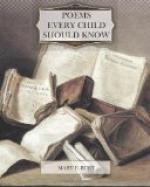They sailed and sailed, as
winds might blow,
Until at last
the blanch’d mate said;
“Why, now, not even God would
know
Should I and all
my men fall dead.
These very winds forget their
way,
For God from these
dread seas is gone.
Now speak, brave Admiral,
and say——”
He said:
“Sail on! and on!”
They sailed, they sailed,
then spoke his mate:
“This mad sea
shows his teeth to-night,
He curls his lip, he lies
in wait,
With lifted teeth
as if to bite!
Brave Admiral, say but one
word;
What shall we
do when hope is gone?”
The words leaped as a leaping
sword:
“Sail on! sail
on! and on!”
Then, pale and worn, he kept
his deck,
And thro’
the darkness peered that night.
Ah, darkest night! and then
a speck,—
A light! a light!
a light! a light!
It grew—a star-lit
flag unfurled!
It grew to be
Time’s burst of dawn;
He gained a world! he gave
that world
Its watch-word:
“On! and on!”
JOAQUIN MILLER.
THE SHEPHERD OF KING ADMETUS.
Once a year the children learn “The Shepherd of King Admetus,” which is one of the finest poems ever written as showing the possible growth of real history into mythology, the tendency of mankind to deify what is fine or sublime in human action. Not every child will learn this entire poem, because it is too long. But every child will learn the best lines in it while the children are teaching it to me and when I take my turn in teaching it to them. No child fails to catch the spirit and intent of the poem and to become entirely familiar with it. (1819-91.)
There came a youth upon the
earth,
Some thousand
years ago,
Whose slender hands were nothing
worth,
Whether to plow,
or reap, or sow.
Upon an empty tortoise-shell
He stretched some
chords, and drew
Music that made men’s
bosoms swell
Fearless, or brimmed
their eyes with dew.
Then King Admetus, one who
had
Pure taste by
right divine,
Decreed his singing not too
bad
To hear between
the cups of wine:
And so, well pleased with
being soothed
Into a sweet half-sleep,
Three times his kingly beard
he smoothed,
And made him viceroy
o’er his sheep.
His words were simple words
enough,
And yet he used
them so,
That what in other mouths
was rough
In his seemed
musical and low.
Men called him but a shiftless
youth,
In whom no good
they saw;
And yet, unwittingly, in truth,
They made his
careless words their law.
They knew not how he learned
at all,
For idly, hour
by hour,
He sat and watched the dead
leaves fall,
Or mused upon
a common flower.




